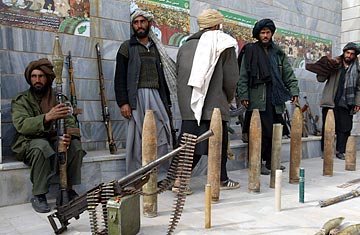
Taliban militants who joined the Afghan government's reconciliation and reintegration program, in Herat, March 14, 2010
Pakistan's arrest of a dozen top Taliban leaders — military commanders, strategic planners and a financier — over the past six weeks is viewed by Afghan and NATO officials with a mixture of relief and suspicion. On one hand, the arrests have disrupted the insurgents' chain of command, making it tougher for the Taliban's war council to relay funds and battle plans to their commanders fighting NATO troops. But according to Afghan officials and diplomats in Kabul, the roll-up of Taliban leaders has dealt a blow to secret, preliminary talks under way during the past six months between President Hamid Karzai and the Taliban, as well as those conducted through a separate channel between the Taliban and U.N. envoys.
Sources consulted by TIME in Peshawar, Kabul and Kandahar all characterize those Taliban commanders picked up by Pakistani intelligence agencies as being more malleable to peace talks with Karzai than a core of hard-liners within the Taliban's ruling shura, or council, who are thought to be hiding in the Pakistani cities of Quetta or Karachi. One foreign diplomat in Kabul says he looked at the list of 14 Taliban arrested by the Pakistanis and thought, "I knew eight of them personally, and they were all in favor of a peace process." This was confirmed by Kai Eide, the U.N.'s former Special Representative in Afghanistan, who told the BBC on March 18 that Pakistan's arrests had cut short "talks about talks" between the U.N. and the Taliban in Dubai.
In a separate channel, President Karzai tapped his ancient clan connections to send out feelers to Mullah Abdul Ghani Baradar, until recently the Taliban's top military commander, and other Taliban officials who belonged to the President's Popalzai tribe. This led to one or possibly several secret meetings between the Taliban and Karzai's representatives in Saudi Arabia, brokered by that country's King Abdullah. Baradar was captured in Karachi last month in a joint operation by Pakistani and U.S. intelligence agents, in the first of a string of high-profile arrests. In Kabul, a senior Cabinet official complained to TIME, "The Pakistanis knew every movement that these commanders made inside Pakistan over the last eight years. So why did they arrest them now, when we were starting to get somewhere with the Taliban?"
First off, the Obama Administration is upping pressure on Pakistan to crack down on the Taliban, who for the past eight years have been using Pakistani soil, without risk of capture, for R&R, for plotting their battlefield strategies and for gathering funds and fresh jihadi recruits, especially suicidal teenage bombers from Pakistani madrasahs, Islamic religious schools. But Afghan officials, diplomats and former Taliban ascribe more circuitous motives to the Pakistanis. They say that Pakistan's military and intelligence services were peeved that in both the Dubai and the Saudi talks, senior Taliban went ahead to meet with Karzai's representative and U.N. envoys without first getting clearance from the Pakistanis, who had been the Taliban's main backers since they surfaced in the mid-1990s. Basically, says a diplomat, "the Pakistanis are arresting those Taliban they can't control." A former Taliban Cabinet minister and ambassador, Mullah Abdul Salam Zaeef, who served time in Guantánamo, concurs, "Pakistan is making these Taliban vanish so that they can't talk."
Kabul has officially asked for the extradition of the arrested Taliban commanders, but according to Pakistani press reports, Islamabad is refusing. Islamabad also rebuffed U.S. requests to interrogate the captured Taliban without the presence of Pakistani intelligence officers. The upshot, says Thomas Ruttig, a director of Afghanistan Analysts Network, an international think tank in Kabul, is that Pakistan has skillfully put the breaks on the peace process, just as an international consensus, led by the Europeans, is building toward ending NATO'S nine-year conflict with the Taliban through negotiation. "Pakistan would rather there be no talks than talks without their control," says Ruttig.
To build momentum for peace, Karzai in April will hold a jirga, or tribal council, of more than 1,800 parliamentarians, clerics, judges and provincial officials. Farooq Wardak, the Education Minister and organizer of the jirga, tells TIME, "As a nation, we have to agree on the parameters for peace with the Taliban." He says that the "red lines" the Karzai government will refuse to cross in talks with their Taliban adversaries are altering the constitution and withdrawing NATO troops. He adds that many liberal Afghans want safeguards that a future deal with the Taliban won't abolish women's hard-won freedoms in schooling. Many Afghans, he says, also have bitter memories of killings carried out against non-Pashtun communities during the harsh Taliban regime.
So, what does Pakistan want? A senior Afghan diplomat says that when Karzai flew to Islamabad on March 11, he was told by Pakistan's army chief, Ashraf Parvez Kiyani, that Pakistan will nudge the Taliban into future peace talks with Karzai only when the Afghan President starts curtailing the growing influence of India, Pakistan's regional rival, in Afghanistan. Also, according to these sources, Pakistan wants to see a greater Pashtun representation in Kabul, not only Taliban but also two other insurgent groups, the Haqqani network, which operates in eastern Afghanistan, and former warlord Gulbuddin Hekmatyar's group. Both Haqqani and Hekmatyar have long-standing ties with Pakistani's intelligence services.
